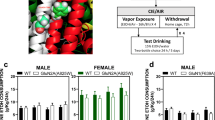Heading
Abstract
Rationale. It has previously been shown that drugs, such as benzodiazepines, that inhibit seizure activity during ethanol withdrawal, fail to alleviate the potentiated withdrawal seen following repeated episodes of withdrawal when administered during each withdrawal episode. Acute administration of the N-methyl-D-aspartate (NMDA) receptor competitive antagonist, CGP39551, has been shown to inhibit seizure activity during ethanol withdrawal, and, when administered during the periods of repeated diazepam withdrawal, it blocked the reduction in pentylenetetrazol (PTZ) seizure threshold seen following a final, untreated withdrawal.
Objectives. The aim of the current study was to determine if CGP39551 could alter final ethanol-withdrawal symptoms when administered during the acute intermittent withdrawal periods.
Methods. Mice were chronically treated with ethanol-containing liquid diet for either 30 days continuously (single withdrawal) or with 8-h withdrawal periods on day 16 and day 23 of treatment (repeated withdrawal). Control animals received a control diet for the same period of time. On the final withdrawal animals were tested for behavioural signs of withdrawal. The effect of CGP39551 administered acutely on withdrawal [up to 5 mg/kg, intraperitoneally (i.p.)] or during the intermittent withdrawal periods (10 mg/kg, i.p.) was examined.
Results. Acute administration of CGP39551 failed to inhibit handling-induced convulsions in the single-withdrawal or repeated-withdrawal group and had no effect on either decreased exploration or increased sensitivity to PTZ seen in withdrawal. Surprisingly, when CGP39551 was administered during periods of repeated ethanol withdrawal a potentiation of seizure activity was seen in the final, untreated withdrawal. This potentiation of seizure activity, compared with vehicle-treated animals, was not seen when CGP39551 was given whilst animals had access to ethanol (single-withdrawal group and repeated-withdrawal group where CGP39551 treatment was non-contingent with withdrawal episodes). However, the decrease in exploration seen during withdrawal was potentiated in repeated-withdrawal animals treated with CGP39551 irrespective of the time at which the CGP39551 was administered.
Conclusions. Treatment with an NMDA receptor-competitive antagonist potentiated the ethanol-withdrawal syndrome in animals with previous experience of ethanol withdrawal.
Similar content being viewed by others
Author information
Authors and Affiliations
Additional information
Electronic Publication
Rights and permissions
About this article
Cite this article
Ripley, T.L., Dunworth, S.J. & Stephens, D.N. Effect of CGP39551 administration on the kindling of ethanol-withdrawal seizures. Psychopharmacology 163, 157–165 (2002). https://doi.org/10.1007/s00213-002-1138-7
Received:
Accepted:
Issue Date:
DOI: https://doi.org/10.1007/s00213-002-1138-7




